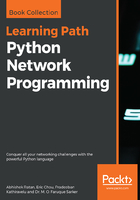
DevOps
Historically, there have been two specific teams in every networking department. One of the teams is the engineering team, which is responsible for conceiving new ideas to improve the network and designing, deploying, and optimizing the current infrastructure. This team is primarily responsible for performing tasks such as configuration and cabling from scratch.
The other team is the support team. This team, also known as the operations team, ensures the current deployed infrastructure is up and running and focuses on performing day-to-day activities such as upgrades, quick fixes, and support to any consumers of that network infrastructure. In a traditional model, there are hand-offs and knowledge transfers from the engineering team to the operations team for support of the current deployed infrastructure. Because of the segregation of the two teams, the engineer team members do not focus on writing clear documentation, or sometimes do not even provide adequate information to operations team members, causing delays in troubleshooting and fixing issues. This could even lead to a simple solution scaling to a bigger problem because of the different approach that a engineering team member would take compared to an operations team member.
Nowadays, to solve this problem, the DevOps model was conceived, which brings the best from both teams. Rather than being a fancy designation, a DevOps model is a culture that needs to be created among the current teams. In a DevOps model, an engineer from any team is responsible for the complete life cycle of a specific project. This includes creating part of the infrastructure and supporting it by themselves. A big benefit of this model is that because a person has created a part of the system and supports it, they know all the aspects of that part and can work on it again to make it better by understanding the challenges that arise from customer or user experiences. A DevOps engineer should understand the engineering and operations for the part of the infrastructure that they have created. By adding an automation skill set to the DevOps experience, an engineer can manage complex tasks with ease and focus on reliability and scalability in a better manner than engineers who are distributed in different domains in the traditional model.